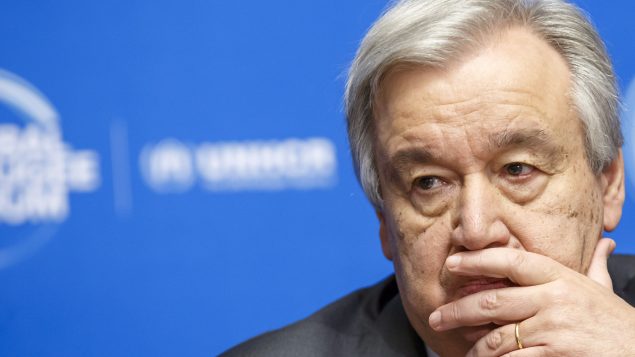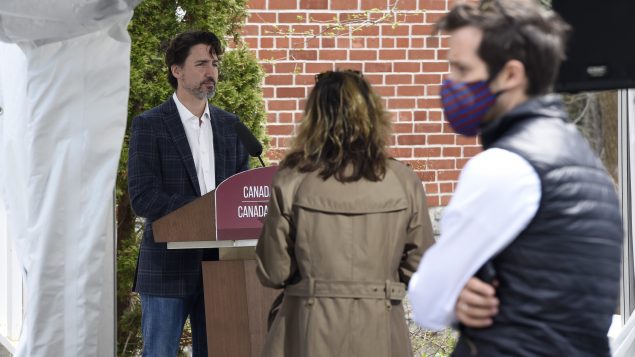Prime Minister Justin Trudeau said Monday that Canada has pledged to invest $850 million in Canadian and international research to accelerate the global development of COVID-19 vaccines as well as tests and treatments for the fight against the pandemic.
Speaking at his daily briefing in Ottawa, Trudeau said the $850 million commitment includes funding for research at Canadian laboratories and research facilities but also support for vaccine development through the Coalition for Epidemic Preparedness Innovations, and the World Health Organization’s Solidarity Trial that helps hospitals share information on treatments.
The funding will also go towards coordinating a COVID-19 viral and host genome sequencing effort across Canada; providing COVID-19 diagnostic support to more than 20 partner countries; and creating strategies to tackle misinformation, stigma, and fear, Trudeau said.
“The more we cooperate, the more likely that we find a cure, and find it quickly,” Trudeau said.
International pledging conference
Earlier in the morning, Trudeau joined other world leaders in an online event to launch the Coronavirus Global Response.
This pledge drive aims to initially raise more than $8 billion US ($11 billion Cdn) to help develop a coronavirus vaccine to be used globally, as well as other tools to defeat the deadly virus and prevent its spread.
- Canada and EU pledge international cooperation in COVID-19 fight
- Trudeau unveils new measures to mobilize industry in COVID-19 fight
The European Commission pledged $1.09 billion US, Japan pledged over $830 million US, Saudi Arabia said it is putting forward $500 million US and Britain pledged $482 million US. In all, countries raised over $5 billion US by Monday morning.
“The scope of our response must match the scope of the crisis,” said European Council President Charles Michel. “These are dark days, but they are also days that reveal our humanity.”
One notable absence from the event was the United States. A U.S. State Department spokesperson stressed that Washington supports the pledging effort and is leading international efforts to defeat the virus.
Also, it was not immediately clear how many of Monday’s pledges constituted new funding.
$40 billion may be needed to fight the pandemic, says UN chief

FILE – In this Dec. 17, 2019 file photo, U.N. Secretary-General Antonio Guterres attends the UNHCR – Global Refugee Forum at the European headquarters of the United Nations in Geneva, Switzerland. (Salvatore Di Nolfi/Keystone via AP, File)
UN Secretary General Antonio Guterres Guterres welcomed the contribution pledges, calling them “a kind of a down payment for developing the new tools at the speed needed.”
“But to reach everyone, everywhere, we will likely need five times that amount,” the UN chief said. “I call on all partners to join in this effort as we look to gather again in late May to sustain our momentum.”
Trudeau said the pledging conference was just a beginning.
“It is really important that the world comes together to collaborate because even once we find a vaccine, whether it’s in Canada or elsewhere around the world, we will share that vaccine in its formula, but production of that vaccine will be extremely important right around the world as well,” Trudeau said.
“It cannot just be the wealthiest countries producing that vaccine for their citizens, we need to ensure that there are systems in place so that the billions of people around the world who are vulnerable can get these vaccines as well.”
Canada’s role is critical, says World Vision

A girl wears a protective face mask at a makeshift camp for refugees and migrants next to the Moria camp, during a nationwide lockdown to contain the spread of the coronavirus disease (COVID-19), on the island of Lesbos, Greece April 02, 2020. (Elias Marcou/REUTERS)
Michael Messenger, president and CEO of World Vision Canada, said it’s critical that Canada is a key part of a globally-coordinated response, including financial contributions.
“More than ever, the health of Canadians is closely linked to the health of people around the world,” Messenger said in a statement. “To find a vaccine and defeat this virus, we need urgent action. It’s a race against time to prevent a total catastrophe, especially in refugee camps and other highly vulnerable places.”
Outbreaks in these vulnerable populations, increase the risk of a second wave coming back to impact Canada, he said.
“To make matters worse, potentially devastating secondary impacts are looming, particularly for children,” Messenger said. “The lives of millions of girls and boys are in danger as weak health systems are stretched and broken by the coronavirus response, preventing them from getting vaccines for other deadly diseases.”
Humanitarian NGOs are deeply concerned that the pandemic could set back years of progress in global child health, Messenger added.







For reasons beyond our control, and for an undetermined period of time, our comment section is now closed. However, our social networks remain open to your contributions.